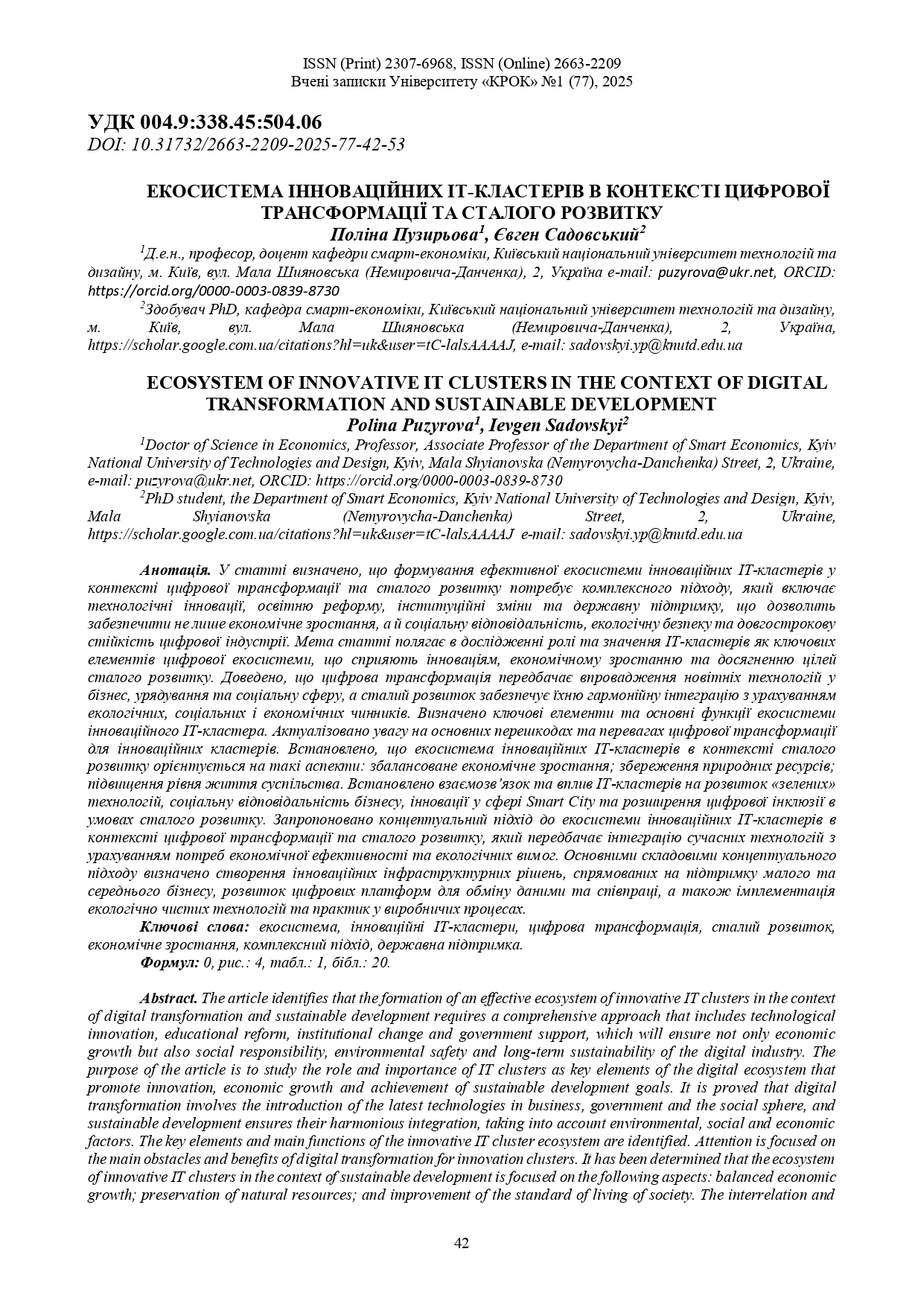ECOSYSTEM OF INNOVATIVE IT CLUSTERS IN THE CONTEXT OF DIGITAL TRANSFORMATION AND SUSTAINABLE DEVELOPMENT
DOI:
https://doi.org/10.31732/2663-2209-2025-77-42-53Keywords:
ecosystem, innovative IT clusters, digital transformation, sustainable development, economic growth, integrated approach, government supportAbstract
The article identifies that the formation of an effective ecosystem of innovative IT clusters in the context of digital transformation and sustainable development requires a comprehensive approach that includes technological innovation, educational reform, institutional change and government support, which will ensure not only economic growth but also social responsibility, environmental safety and long-term sustainability of the digital industry. The purpose of the article is to study the role and importance of IT clusters as key elements of the digital ecosystem that promote innovation, economic growth and achievement of sustainable development goals. It is proved that digital transformation involves the introduction of the latest technologies in business, government and the social sphere, and sustainable development ensures their harmonious integration, taking into account environmental, social and economic factors. The key elements and main functions of the innovative IT cluster ecosystem are identified. Attention is focused on the main obstacles and benefits of digital transformation for innovation clusters. It has been determined that the ecosystem of innovative IT clusters in the context of sustainable development is focused on the following aspects: balanced economic growth; preservation of natural resources; and improvement of the standard of living of society. The interrelation and influence of IT clusters on the development of green technologies, social responsibility of business, innovations in the field of Smart City and the expansion of digital inclusion in the context of sustainable development are determined. The author proposes a conceptual approach to the ecosystem of innovative IT clusters in the context of digital transformation and sustainable development, which involves the integration of modern technologies, taking into account the needs of economic efficiency and environmental requirements. The main components of the conceptual approach are the creation of innovative infrastructure solutions aimed at supporting small and medium-sized businesses, the development of digital platforms for data exchange and collaboration, and the implementation of environmentally friendly technologies and practices in production processes.
Downloads
References
Абашкіна, Н. А. & Ніколаєв, Ю. О. (2021). Кластерна стратегія інноваційного розвитку України. Інфраструктура ринку, 54, 3-7. https://doi.org/10.32843/infrastruct54-1.
Борисов, М. П. (2024). Механізми державного управління інноваційним розвитком економіки України на засадах кластеризації. Суспільство та національні інтереси, 8, 492-503. https://doi.org/10.52058/3041-1572-2024-8(8)-492-503.
Бубенко, П. Т. & Дріль, Н. В. (2023). Детермінанти кластеризації в контексті територіального інноваційного розвитку. Бізнес Інформ, 11, 103-108. https://doi.org/10.32983/2222-4459-2023-11-103-108.
Войнича, Л. & Кожель, П. (2024). Теоретико методичні основи кластеризації як інструменту управління інноваційно інвестиційним розвитком промислових підприємств. Вісник Львівського національного університету природокористування. Серія : Економіка АПК, 31, 135-145. https://doi.org/10.31734/economics2024.31.019.
Живко, З. Б., Райковська, І. Т., Ковтун, О. А. & Кургузенкова, Л. А. (2023). Система ризик-менеджменту підприємств сфери послуг при формуванні інноваційних кластерів. Формування ринкових відносин в Україні, 7-8, 59-66. https://doi.org/ 10.5281/zenodo.8420789.
Залознова, Ю. С. & Солдак, М. О. (2021). Міжнародний високотехнологічний кластер як складова сучасної концепції європейської інтеграції до науково-освітнього та інноваційного простору. Вісник економічної науки України, 2(41), 113-126. https://doi.org/10.37405/1729-7206.2021.2(41).113-126.
Зось-Кіор, М. В., Гнатенко, І. А., Телічко, Н. А. & Корнєв, Р. С. (2022). Кластерізація за рівнем фінансового менеджменту інноваційно орієнтованих агропідприємств в умовах активізації логістичної та зовнішньоекономічної діяльності, діджиталізації та управління змінами. Формування ринкових відносин в Україні, 6, 137-146. https://doi.org/10.5281/zenodo.7249864
Кудин, С. І. (2023). Кластери як основа інноваційного розвитку бізнесу в регіонах України. Ефективна економіка, 6, URL: http://nbuv.gov.ua/UJRN/efek_2023_6_24. http://doi.org/10.32702/2307-2105.2023.6.22.
Кукса, І. М., Гнатенко, І. А., Вараксіна, О. В., Матієнко-Зубенко, І. І. & А. В. Черевко (2021). Моделювання колаборацією в інноваційних кластерах: управління інституціональними змінами, конкурентоспроможністю, фінансовою та логістичною інфраструктурою в умовах сталого розвитку агропродовольчої сфери. Формування ринкових відносин в Україні, 10, 59-68. https://doi.org/10.5281/zenodo.5807302.
Лаврук, В. В. & Лаврук, О. С. (2024). Кластери як інноваційний інструмент досягнення глобальних цілей в управлінні продовольчою безпекою. Ефективна економіка, 2, URL: http://nbuv.gov.ua/UJRN/efek_2024_2_16. http://doi.org/10.32702/2307-2105.2024.2.14.
Лаврухіна, К. О. & Кравчук, О. А. (2024). Інноваційні аспекти кластерних ініціатив в умовах цифровізації економіки України. Проблеми і перспективи економіки та управління, 2, 21-33. https://doi.org/10.25140/2411-5215-2024-2(38)-21-33.
Лаврухіна, К. О. (2023). Кластери в промислових екосистемах – нові інноваційні тренди розвитку повоєнної України. Екологічна безпека та природокористування, 4, 62-73. https://doi.org/10.32347/2411-4049.2023.4.62-73.
Ольшанська, О. В. & Пузирьова, П. В. (2021). Механізм державної фінансової підтримки стимулювання інновацій в інтегрованих кластерах. Формування ринкових відносин в Україні, 10, 32-41. https://doi.org/10.5281/zenodo.5807276.
Онофрійчук, Я. І. (2023). Архітектоніка структурних інноваційних форм кластерооб’єднаних підприємств. Міжнародний науковий журнал «Інтернаука». Серія : Економічні науки, 9(1), 87-97. https://doi.org/10.25313/2520-2294-2023-9-9310.
Панченко, В. А., Кононенко, С. О. & Кононенко, Л. В. (2023). Регіональний інноваційний кластер в умовах цифровізації освіти і виробництва. Економічний простір, 183, 108-113. https://doi.org/10.32782/2224-6282/183-17.
Уткін, В. П. (2022). Проблеми та підходи до розвитку концепцій інноваційних кластерних об’єднань. Управління економікою: теорія та практика, 9, 137-147. https://doi.org/10.37405/2221-1187.2022.137-147
Юхнов, Б. Ю., Корсаков, Д. О. & Юхман, Я. В. (2021). Актуалізація використання кластерної моделі в інноваційному розвитку економіки України. Бізнес Інформ, 10, 63-69. https://doi.org/10.32983/2222-4459-2021-10-63-69.
Olshanska, O., Puzyrova, P. & Shevchenko, O. (2023). Integrative approach and clusterization as elements of effective tourism industry management in the conditions of sustainable development. Менеджмент, 2(38), 48-60. https://doi.org/10.30857/ 2415-3206. 2023.2.4.
Puzyrova, P. (2019). Cluster education management concept through the prism of financial risk optimization and resource support. Менеджмент, 2(30), 62-74. https://doi.org/10.30857/2415-3206.2019.2.5.
Sadovskyi, Ie. & Puzyrova, P. V. (2024). Theoretical and conceptual basis for the functioning of innovation clusters in the sphere of information technologies. Журнал стратегічних економічних досліджень, 4(21), 111-119. https://doi.org/10.30857/2786-5398.2024.4.10.

Downloads
Published
How to Cite
Issue
Section
License

This work is licensed under a Creative Commons Attribution-NonCommercial 4.0 International License.

